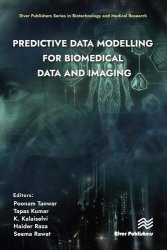Predictive Data Modelling for Biomedical Data and Imaging
- Добавил: literator
- Дата: 22-06-2024, 03:37
- Комментариев: 0
 Название: Predictive Data Modelling for Biomedical Data and Imaging
Название: Predictive Data Modelling for Biomedical Data and ImagingАвтор: Poonam Tanwar, Tapas Kumar, K. Kalaiselvi, Haider Raza
Издательство: River Publishers
Год: 2024
Страниц: 392
Язык: английский
Формат: pdf (true)
Размер: 19.4 MB
In this book, we embark on a journey into the realm of predictive data modeling for biomedical data and imaging in healthcare. It explores the potential of predictive analytics in the field of medical science through utilizing various tools and techniques to unravel insights and enhance patient care. This volume creates a medium for an interchange of knowledge from expertise and concerns in the field of predictive data modeling. In detail, the research work on this will include the effective use of predictive data modeling algorithms to run image analysis tasks for understanding.
Predictive Data Modelling for Biomedical Data and Imaging is divided into three sections, namely Section I – Beginning of Predictive Data Modeling for Biomedical Data and Imaging/Healthcare, Section II – Data Design and Analysis for Biomedical Data and Imaging/Healthcare, and Section III – Case Studies of Predictive Analytics for Biomedical Data and Imaging/Healthcare. We hope this book will inspire further research and innovation in the field of predictive data modeling for biomedical data and imaging in healthcare. By exploring diverse case studies and methodologies, this book contributes to the advancement of healthcare practices, ultimately improving patient outcomes and well-being.
Better healthcare and precise medicine may be developed using AI and multipurpose ML systems. These platforms may be used to find the best routes to customize and affordable therapies. Deep Learning algorithms focus on inducement of alike conclusions as human beings ensure by incessantly examining data conferring to a specified rational structure. It allows for machines to work on different images, audio files, and text to achieve human-like tasks. Therefore, in order to accomplish it, Deep Learning practices neural networks, which is a multi-layered structure of algorithms.
TensorFlow is an open-source software library for dataflow and differentiable programming across a range of tasks. It is developed by Google and was first released in 2015. TensorFlow is designed to be a flexible, scalable, and efficient platform for building and training Machine Learning models. TensorFlow is based on a graph-based computation model where nodes in the graph represent mathematical operations and edges represent the flow of data between them. This makes it easy to parallelize computations and optimize performance, especially for large-scale Machine Learning tasks. TensorFlow provides a wide range of tools and APIs for building and training various types of Machine Learning models, including neural networks, decision trees, and regression models. It also includes pre-built libraries and tools for common deep learning tasks, such as data preparation, feature extraction, and model evaluation.
Keras is an open-source neural network library written in Python. It is designed to be a user-friendly, modular, and extensible Deep Learning frame work that allows developers to build and train Machine Learning models quickly and easily. Keras provides a high-level API that allows developers to easily build and train neural networks without having to worry too much about the low-level implementation details. It also supports various backends, such as TensorFlow, Theano, and Microsoft Cognitive Toolkit, which allows users to run their models on different hardware and software platforms. Keras supports various types of neural networks, including feedforward, convolutional, recurrent, and combination models.
Скачать Predictive Data Modelling for Biomedical Data and Imaging
Внимание
Уважаемый посетитель, Вы зашли на сайт как незарегистрированный пользователь.
Мы рекомендуем Вам зарегистрироваться либо войти на сайт под своим именем.
Уважаемый посетитель, Вы зашли на сайт как незарегистрированный пользователь.
Мы рекомендуем Вам зарегистрироваться либо войти на сайт под своим именем.
Информация
Посетители, находящиеся в группе Гости, не могут оставлять комментарии к данной публикации.
Посетители, находящиеся в группе Гости, не могут оставлять комментарии к данной публикации.
